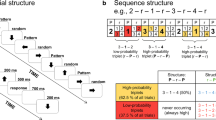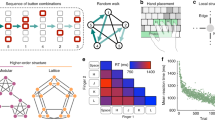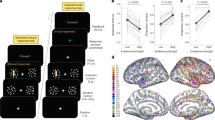Abstract
Event-related brain potentials (ERPs) were recorded to explore the electrophysiological correlates of breaking mental set when subjects performed the Chinese character-generation task. A new experimental paradigm (learning–testing model) was adopted in order to make subjects find a solution actively by using a fixed way (Rep: repetition) or a new method (BMS: breaking mental set). Results showed that BMS elicited a more positive ERP deflection (P500-700) than did Rep between 500 and 700 ms after onset of the test stimuli. The P500-700 was possibly involved in the successful breaking of mental set and the initial forming of new associations during problem solving. Furthermore, BMS also elicited a more positive ERP deflection (P900-1300) than did Rep between 900 and 1,300 ms. The P900-1300 might reflect searching and generating a new character after breaking mental set.



Similar content being viewed by others
References
Ash IK, Wiley J (2006) The nature of restructuring in insight: an individual-differences approach. Psychonomic Bull Rev 13:66–73
Berti S, Geissler HG, Lachmann T, Mecklinger A (2000) Event-related brain potentials dissociate visual working memory processes under categorial and identical comparison conditions. Cognitive Brain Res 9:147–155
Bowden EM, Jung-Beeman M, Fleck J, Kounios J (2005) New approaches to demystifying insight. Trends Cogn Sci 9:322–328
Chronicle EP, Ormerod TC (2001) When insight just won’t come: the failure of visual cues in the nine-dot problem. Q J Exp Psychol 54:903–919
Donchin E, Coles MGH (1988) Is the P300 component a manifestation of context updating? Behav Brain Sci 11:355–372
Jung-Beeman M, Bowden EM, Haberman J, Frymiare JL, Arambel-Liu S, Greenblatt R, Reber PI, Kounios J (2004) Neural activity when people solve verbal problems with insight. Plos Biol 2:500–510
Kaplan CA, Simon HA (1990) In search of insight. Cog Psychol 22:374–419
King JW, Kutas M (1995) Who did what and when? Using word and clause-level ERPs to monitor working memory usage in reading. J Cognitive Neurosci 7:376–395
Knoblich G, Ohlsson S, Haider H, Rhenius D (1999) Constraint relaxation and chunk decomposition in insight problem solving. J Exp Psychol Learn Mem Cogn 25:1534–1555
Knoblich G, Ohlsson S, Raney GE (2001) An eye movement study of insight problem solving. Mem Cognition 29:1000–1009
Köhler W (1925) The mentality of apes. Routledge and Kegan Pau, London
Kutas M, McCarthy G, Donchin E (1977) Augmenting mental chronometry. The P300 as a measure of stimulus evaluation time. Science 197:792–795
Lang S, Kanngieser N, Jaskowski P, Haider H, Rose M, Verleger R (2006) Precursors of insight in event-related brain potentials. J Cognitive Neurosci 18:2152–2166
Luo J, Knoblich G (2007) Studying insight problem solving with neuroscientific methods. Methods 42:77–86
Luo J, Niki K (2003) The function of hippocampus in ‘insight’ of problem solving. Hippocampus 13:274–281
Luo J, Niki K, Phillips S (2004) Neural correlates of the ‘Aha! Reaction’. NeuroReport 15:2013–2017
MacGregor JN, Ormerod TC, Chronicle EP (2001) Information processing and insight: a process model of performance on the nine-dot and related problems. J Exp Psychol Learn Mem Cogn 27:176–201
Mai XQ, Luo J, Wu JH, Luo YJ (2004) ‘Aha!’ effects in guessing riddle task: an ERP study. Hum Brain Mapp 22:261–270
Mecklinger A, Pfeifer E (1996) Event-related potentials reveal topographical and temporal distinct neuronal activation patterns for spatial and object working memory. Cognitive Brain Res 4:211–224
Ölinger M, Jones G, Knoblich G (2008) Investigating the effect of mental set on insight problem solving. Exp Psychol 55:270–282
Ormerod TC, MacGregor JN, Chronicle EP (2002) Dynamics and constraints in insight problem solving. J Exp Psychol Learn Mem Cogn 28:791–799
Qiu J, Li H, Luo YJ, Chen AT, Zhang QL (2006) Brain mechanism of cognitive conflict in a guessing chinese logogriph task. NeuroReport 17:679–682
Qiu J, Zhang QL, Li H, Luo YJ, Chen AT, Yuan H (2007) The ERP effects of cognitive conflict in a Chinese character-generation task. NeuroReport 18:881–886
Qiu J, Li H, Yang D, Luo YJ, Li Y, Wu ZZ, Zhang QL (2008) The neural basis of insight problem solving: an event-related potential study. Brain Cognition 68:100–106
Ruchkin DS, Johnson JR, Grafman J, Canoune H, Ritter W (1992) Distinctions and similarities among working memory processes: an event-related potential study. Cognitive Brain Res 1:53–66
Scheerer M (1963) Problem solving. Sci Amer 208:118–128
Wang T, Zhang QL, Li H, Qiu J, Tu S, Yu CY (2009) The time course of Chinese riddles solving: evidence from an ERP study. Behav Brain Res 199:278–282
Acknowledgments
This research was supported by the Specialized Research Fund for the Doctoral Program of Higher Education of China (No. 200806351002), the National Natural Science Foundation of China (30800293), and the Science and Technology Innovation Foundation of graduate student in Southwest China University (KY2008005).
Author information
Authors and Affiliations
Corresponding author
Additional information
Yufang Zhao and Shen Tu contributed equally to this work.
Rights and permissions
About this article
Cite this article
Zhao, Y., Tu, S., Lei, M. et al. The neural basis of breaking mental set: an event-related potential study. Exp Brain Res 208, 181–187 (2011). https://doi.org/10.1007/s00221-010-2468-z
Received:
Accepted:
Published:
Issue Date:
DOI: https://doi.org/10.1007/s00221-010-2468-z




